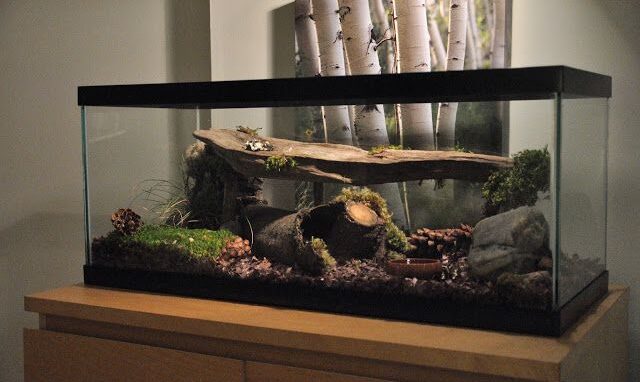As for the height and length of the terrarium, it also takes the most of the discussion among snake lovers. Each of them is beneficial in various ways, but it makes us wonder: out of the two which one will suit your serpentine friend best? Now it’s time to talk about what kind of enclosure snake habitats are, whether tall aquarium vs long for snake are good.
Firstly, investigate the types of snakes that may inhabit the mentioned sites. Then, examine their likely behaviors and activities. Finally, determine the specific habitats these snakes would prefer.
Understanding Snake Behavior and Habitat Needs
However, to compare the height of the aquariums and the length of the enclosures for snakes more information about the snakes ‘nature and their preferences is required. Of course, it is a known fact that the majority of snake species are terrestrial found in various ecosystems of the world and so they prefer the ground or any other flat surface when moving or hunting for prey. However, that should be noted that there are some climbers, and thus the use of the vertical
Key Considerations:
- Therefore it is possible to define the distribution of snake species and the identification of the natural habitats.
- Snakes that you should go fishing should be sized appropriately and should be given the potential for great growth.
- Space in your household
- Both for cleaning and for maintenance to easily reach the spot that requires their presence.
- Temperature and humidity control
Quick Comparison: Tall Aquarium vs Long for Snake
Here’s a brief overview of the pros and cons of tall aquariums vs long enclosures for snakes: Now, in the case of long aquariums for tall fish versus tall enclosures for snakes here are some of our comparisons.
| Type | Pros | Cons |
|---|---|---|
| Tall Aquariums | • Vertical climbing opportunities • Space efficiency for rooms with limited floor space • Aesthetic appeal • Pronounced vertical temperature gradient | • Limited floor space • Difficulty in thermoregulation for snakes • Challenging to clean • Potential stress for ground-dwelling species |
| Long Aquariums | • Allows natural horizontal movement • Easy temperature control • Better visibility of snake • Easier maintenance and cleaning • More suitable for most snake species | • Requires more floor space • Limited vertical interest and climbing opportunities • Potentially less visually striking |
Choosing the Right Aquarium for Your Snake
Selecting between a tall aquarium and a long enclosure for your snake involves several factors:
- Identify Your Snake Species: Find out more about your snake’s natural environment. Is this tree-dwelling ground-dwelling or both?
- Consider Size and Growth: Firstly take into account your snake size which it is now as well as the size that it will grow up to be.
- Assess Available Space: Make an estimation of the area of the section of the compound where you want to place the enclosure.
- Budget Considerations: Dissect and discuss the difference in length and height by weighing the cost of building high tanks for fish as compared to a series of lengthy tanks for snakes.
- Maintenance Requirements: Take into consideration the ability to clean and the access to it.
Setting Up Your Snake’s Home
Whether you choose a tall aquarium or a long enclosure for your snake, proper setup is crucial.
Lighting
- UVB lighting for those species that is necessary
- Day/night cycle simulation
Heating
- Accessibility of hot lamps or heat pads
- Creating a temperature gradient
Humidity Control
- Misting systems or humidity boxes refer to equipment and technology that is used to create a fog-like-solution spray of water solution containing formulated perfumes and fragrances all around the facilities using the technology.
- Moisture retainer of proper substrate
Safe Decoration
- Having tree branches to promote climbing which especially used in tall aquariums.
- Several masks are to be worn depending on a particular thermal zone.
- Unpoisonous plants (live or synthetic)
Common Mistakes to Avoid
When setting up a tall aquarium or long enclosure for your snake, avoid these common pitfalls
- Using many ornaments leads to overcrowding of the interior with furniture and accessories.
- Insufficient hiding spots
- Improper temperature gradients
- Employing hazardous or toxic material
- Attending cleaning and maintenance at least once a week
Faqs about tall aquarium vs long for the snake
A long enclosure is usually more suitable for ball pythons since they are mainly terrestrial.
Take into account your snake’s species, natural habitat, and behavior. While most snakes tend to prefer long enclosures, arboreal species might thrive better in taller aquariums.
As a general guideline, aim for an enclosure that is at least as long as your snake and wide enough for it to stretch out completely.
Make sure to spot clean daily and conduct a thorough cleaning every 1-2 months, depending on the size and habits of your snake.
Indeed, arboreal species such as green tree pythons and emerald tree boas can benefit from taller aquariums.
Resources:
For more information on choosing between tall aquariums and long enclosures for snakes, consult these resources.
- ReptiFiles (www. reptifiles. com): Snakes care sheet for different types of snakes.
- Melissa Kaplan’s Herp Care Collection (www. anapsid. org): Reptiles have many needs like any other pets which are taken care of through researching for detailed information.
- Local Herpetological Societies: If you would like professional hands-on help and some friendly and inspiring community support.
- If you want to know about more beautiful snakes then explore our site to see reptiles, eg: pink snakes, red races snakes, flea snakes, etc.
Conclusion:
In conclusion, the debate between tall aquariums and long enclosures for snakes is ongoing. Ultimately, the best option depends on the individual needs of your snake. For instance, long enclosures are generally more appropriate for most snake species because they offer ample space for natural movement. Moreover, they are easier to maintain. On the other hand, tall aquariums can be advantageous for certain arboreal species, provided that they are set up correctly. Thus, it is essential to consider your snake’s specific requirements when making a decision. Always make sure to prioritize your snake’s specific requirements and seek advice from a reptile veterinarian or a knowledgeable herpetologist if you’re unsure.


